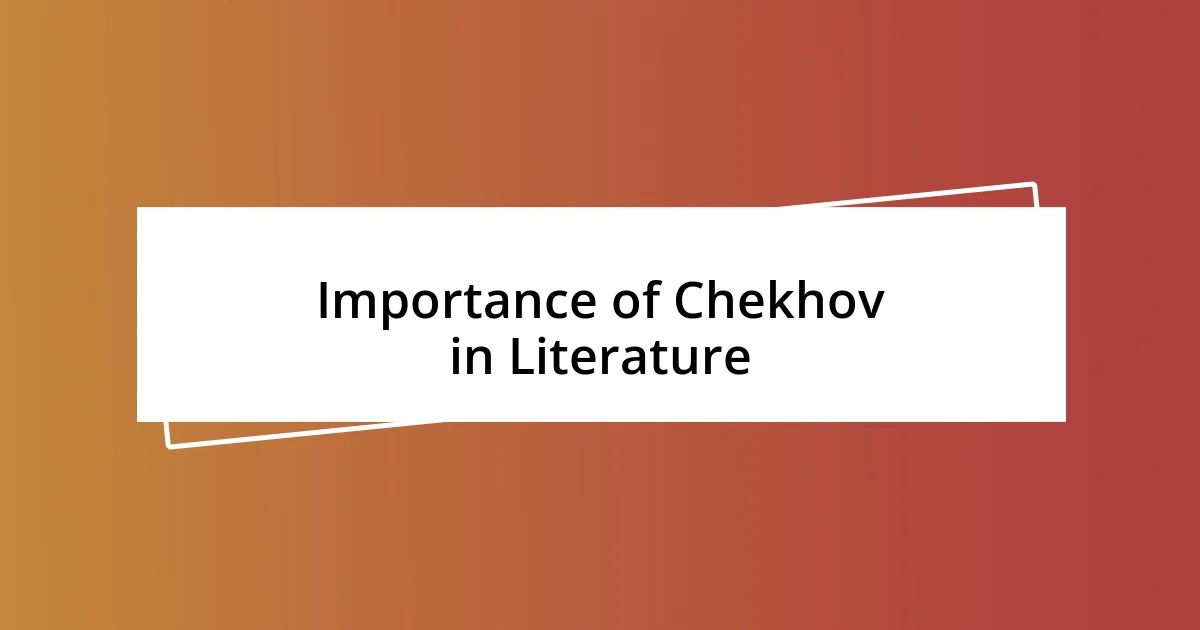Key takeaways:
- Chekhov’s works intricately explore the human experience, capturing the beauty and complexities of everyday life, prompting readers to reflect on their own emotions and relationships.
- His pioneering use of subtext and character depth has significantly influenced modern literature, inviting readers to engage deeply with themes of love, loss, and existentialism.
- Chekhov’s storytelling encourages vulnerability and introspection, demonstrating how ordinary moments can evoke profound insights about life and its intricate connections.

Overview of Chekhov’s Works
Chekhov’s works are a remarkable blend of profound depth and subtle nuance, exploring the human condition with an almost surgical precision. When I first encountered his short stories, I was struck by the way he captured fleeting moments of beauty amidst everyday life—like witnessing a sunset while sipping tea on a quiet evening. It made me question how often I overlook these small details that make up our existence.
His plays, particularly “The Cherry Orchard” and “Uncle Vanya,” left a lasting impression on me due to their exploration of unfulfilled dreams and societal change. I remember feeling an unexpected pang of empathy for characters grappling with their choices, which led me to reflect on my own life decisions. How often do we find ourselves at a crossroads, torn between dreams and reality?
Chekhov’s masterful use of indirection and subtext resonates deeply, inviting readers to engage actively with the narrative. I often find myself pausing to contemplate his ambiguous endings and the myriad of interpretations they can inspire. This depth in his storytelling encourages me to ponder not just the plight of his characters but also the broader questions of hope, despair, and everything in between. Do you feel that same pull when exploring his literary landscape?

Importance of Chekhov in Literature
Chekhov’s significance in literature extends beyond his immediate narratives; he reshaped how we perceive character development and storytelling. I remember the first time I truly understood the depth of his characters—they were not just figments of imagination but reflections of the multifaceted human experience. For me, each character felt like a friend whose complexities I’d come to know, making me realize how we often mirror these struggles in our own lives.
- He pioneered the use of subtext, allowing readers to uncover layers of meaning beneath the surface.
- His writing influenced key 20th-century playwrights and authors, paving the way for modern literature.
- His focus on ordinary life and the intricacies within it resonates with the universal experiences of love, loss, and longing.
Reading Chekhov feels like navigating through an emotional landscape; his literary genius invites us to explore feelings we sometimes shy away from confronting. As I delve deeper into his work, I find myself reflecting on my own relationships and the unsaid words that linger in the air. It’s remarkable how such delicate interactions—a shared glance, a missed opportunity—can leave profound impressions on our lives, a theme Chekhov expertly captures.

My First Encounter with Chekhov
When I first picked up one of Chekhov’s short stories, I had no idea I was about to embark on a journey that would change my perspective on literature. I remember sitting in a cozy café, the soft chatter of patrons around me, as I began reading “The Lady with the Dog.” I was captivated by the way Chekhov portrayed a simple encounter that transformed into something far more profound—much like how an unexpected rainy day can shift your entire mood. It was incredible how such an ordinary situation could evoke such deep emotions in me.
The subtlety of his writing struck me on a personal level. There was a moment, while reading “The Complaints Book,” when I laughed out loud, surprising myself. It reminded me of a time when I had to suppress laughter in a serious meeting. That small, shared moment of humor was a revelation—I realized how Chekhov could encapsulate quirks of human behavior that we often overlook. His stories have this uncanny ability to mirror our lives, leading me to appreciate the eccentricities in my own experiences.
As I navigated through each story, I found myself pondering broader themes, like love, loss, and the ordinariness of life. Chekhov’s characters felt like friends, revealing pieces of themselves that resonated with my own fears and aspirations. I couldn’t help but reflect on my own journeys and the people I’ve met along the way. Have you ever found yourself deeply connected to a character, feeling as if their struggles were your own? That’s how I felt with Chekhov’s work—it’s as if he opened a window into my soul.
| Key Aspects | Personal Reflections |
|---|---|
| First Story Encountered | The Lady with the Dog |
| Setting of First Reading | Cozy café |
| Key Emotion Experienced | Surprise at depth |
| Relatable Moment | Suppressed laughter in a meeting |
| Broader Themes Reflected | Love, loss, and ordinary life |

Key Themes in Chekhov’s Stories
Chekhov’s stories often center around the theme of the passage of time, conveying how it shapes our lives and experiences. I remember reading “The Cherry Orchard” and feeling a profound sense of loss as the characters grappled with change. It hit me hard—how often do we cling to the past, even when it’s fading away? That sense of nostalgia and the inevitable march of time is something I think we all connect with deeply.
Another recurring theme is the complexity of human relationships. In “Uncle Vanya,” the tension between hopes and disappointments felt so real to me. It was as if Chekhov was peeling back the layers of our interactions, exposing our vulnerabilities and the unsaid words that hang in the air. I found myself questioning: have you ever felt that tension with someone close? It’s that blend of love and frustration that Chekhov captures with such finesse, drawing us into the emotional web of his characters.
Lastly, I can’t help but marvel at Chekhov’s exploration of existentialism. Stories like “The Duel” made me reflect on our search for meaning in seemingly mundane lives. There was a moment when I realized how we often chase fleeting moments of happiness, forgetting what truly matters. Have you ever paused to consider what resonates in your heart? Chekhov encourages us to find significance in our everyday struggles, reminding us that even the simplest actions can hold profound meaning.

Analysis of Major Characters
Diving into the personalities Chekhov breathes life into is akin to unraveling the layers of an onion; each character unveils a bit of truth that resonates deeply with us. Take, for instance, the character of Ivan in “Uncle Vanya.” His palpable frustration over unfulfilled dreams and a life wasted evokes a familiarity many of us experience at different points. Have you ever felt the weight of regret clouding your decisions? Watching Ivan navigate his turmoil felt like a mirror reflecting my own moments of doubt and wonder at what could have been.
Then there’s the tender yet conflicted love between Dmitri and Anna in “The Lady with the Dog.” From my perspective, their affair serves as a poignant reminder of the complexities we face in relationships. It’s fascinating how Chekhov illustrates love not as a grand, sweeping emotion, but as something beautifully tangled with guilt and longing. I remember having a conversation with a friend about the nature of love—how it can inspire joy while simultaneously inviting heartache. Chekhov captures this duality effortlessly, making me reflect on love’s unpredictable journey.
Lastly, Chekhov’s depiction of the irascible, yet relatable, character of Lopakhin in “The Cherry Orchard” stands out to me. He embodies the struggle of ambition versus heritage, faced with the task of managing his family’s estate while clutching onto dreams of a modern future. It resonates strongly with my own experiences of balancing tradition with progress. Have you ever felt torn between the expectations of your past and the possibilities of your future? In watching Lopakhin grapple with these issues, I felt a surge of connection—his pursuit of identity echoed my own path, reminding me that navigating these waters is a universal struggle.

How Chekhov Influenced My Writing
Chekhov’s subtle storytelling has truly shaped my writing style. When I first read “The Seagull,” I was struck by how he creates tension through seemingly simple conversations. I began to focus on dialogue in my own work, realizing how powerful spoken words can be in revealing character depth and driving the plot. Isn’t it remarkable how a few carefully crafted lines can evoke such intense emotion?
In “Three Sisters,” the theme of longing resonated with me deeply. I remember feeling a connection to Irina’s dreams of a brighter future, a yearning that mirrored my own aspirations. This inspired me to weave elements of hope and disappointment throughout my stories, creating characters I care about and who feel richly human. Have you ever imagined a character’s future and felt a tug at your heart for them? Chekhov’s ability to portray that sense of yearning pushes me to be vulnerable in my writing.
Moreover, Chekhov taught me the beauty of ambiguity. In a world that often demands clear answers, I started embracing uncertainty in my narratives. I recall drafting a story where the ending left readers questioning what they really learned. It was a thrilling leap of faith, one I found deeply influenced by Chekhov’s approach. How often do we leave things unsaid in life, only to have them linger? I want my readers to experience that same complexity, understanding that life, much like Chekhov’s work, doesn’t always provide neat conclusions.

Reflections on Chekhov’s Legacy
Chekhov’s legacy resonates profoundly with the exploration of everyday human experiences. His ability to transform mundane moments into profound revelations always amazes me. I recall sitting in a café, watching people interact, and felt an overwhelming sense of connection to Chekhov’s world. Isn’t it interesting how he captures the essence of life’s simple intricacies, showing us that beauty often lies in the unremarkable?
Another aspect of Chekhov’s influence on me is his fearless portrayal of vulnerability. When I think about characters like Sonia from “Uncle Vanya,” I’m reminded of my own moments of feeling exposed and lost. Chekhov invites us into the psyche of his creations, revealing their fears and desires, which encourages me to confront my truths. Have you ever felt that kind of raw honesty when observing someone else’s story? It’s like he holds up a mirror, asking us to see ourselves in the reflections of his characters.
Ultimately, Chekhov’s approach to storytelling—marked by a blend of humor, sorrow, and reflection—fills me with gratitude for the complexity of life. It’s akin to sitting with a wise friend who nudges you to ponder deeper questions. I’ve noticed how discussing his works leads to rich conversations about our own struggles and joys. Isn’t that the mark of a true literary genius? Chekhov not only left us with stories but also gave us a framework to understand our own narratives, urging us to explore the depths of our emotions and the connections that bind us.














